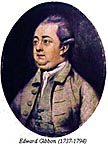 By Eugene Y. C. Ho, Hong Kong (1960-1997)
By Eugene Y. C. Ho, Hong Kong (1960-1997)
"It was at Rome, on the 15th of October 1764," Gibbon later recalled, "as I sat musing amid the ruins of the capitol, while the bare-footed friars were singing vespers in the temple of Jupiter [presently the Church of Santa Maria in Aracoeli], that the idea of writing the decline and fall of the city first started to my mind...."
The work envisioned eventually captivated thousands of historians and laymen alike. Ho explains why.
"First, the greatness and tragical character of the subject catches the attention and arouses the imagination and sympathy of its reader, who finds himself at once introduced to a time most fondly wished for by Man, when most civilised people were peacefully united in "the period in the history of the world, during which the condition of the human race was most happy and prosperous" (Decline and Fall, Ch. 3). Yet, Man somehow lost this grace and now continuously wonders why. In an attempt to ascertain the reason, people turn to Gibbon for enlightenment. Second, for the Western Man in particular, there is here a unique fascination: for out of the ashes of the Western Roman Empire were born the modern nations of Europe, while out of the belated fall of the Eastern Roman Empire came sparks which lit Europe's beacon of humanism and science. Seen in this light, although the Decline and Fall concerns Rome, it is really an ancient history of Europe and European civilisation, and any Western reader is therefore bound to find in this work illumination regarding his origin and roots.
"Originally published in Issue 30 (Apr - Jun 1994) of the Hong Kong intellectual journal Intellectus, Mr. Ho's essay was written to commemorate the bicentennial of the death of Edward Gibbon (1737-1794)."
No comments:
Post a Comment